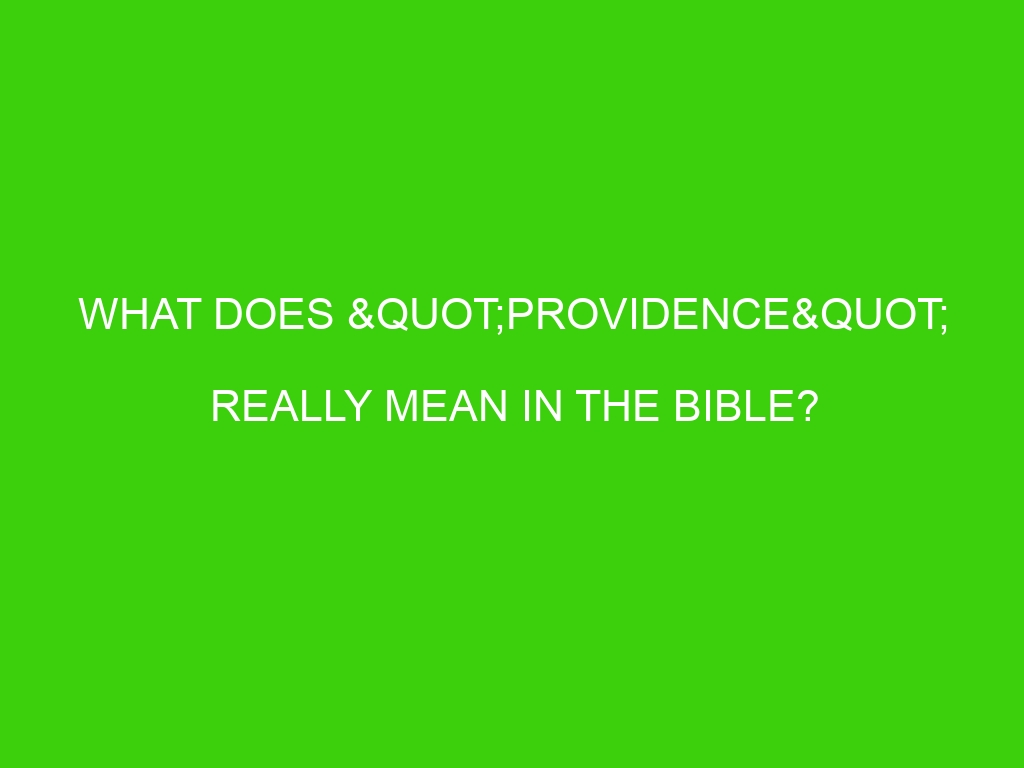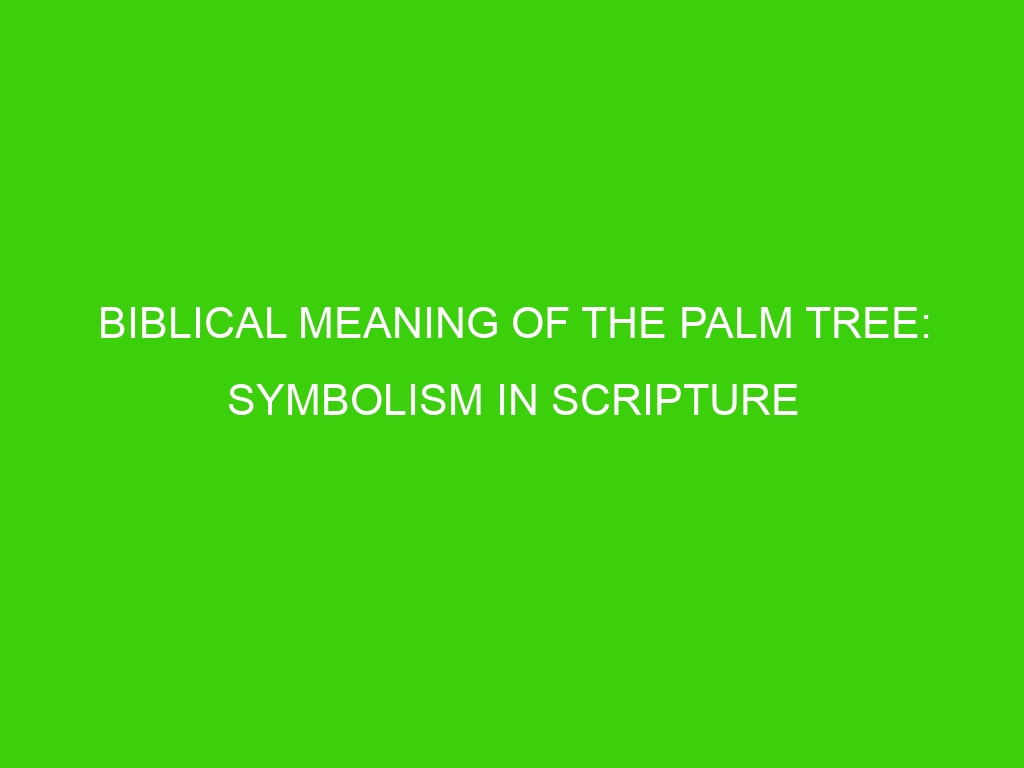You’ve probably heard the word “providence” used in Christian circles before.
And if you’re like most people, you have a vague sense of what it means – God’s provision, God’s blessings, the unfolding of God’s plan.
But do you really know what the Bible means when it talks about God’s providence? In this article, we’ll take a close look at the concept of providence, tracing its usage through Scripture.
We’ll see that it’s a robust theological idea, one that gives us great comfort and hope.
Providence encompasses everything from the smallest details of our lives to the grand sweep of history.
Grasping this truth leads us to deeper trust in God’s sovereign care.
Read on to gain a fuller understanding of this foundational biblical principle.
The Origin and Definition of “Providence”
The word “providence” comes from the Latin word providentia, meaning “foresight.” In the Bible, providence refers to God’s continuous oversight and care of His creation.
It’s the belief that God not only created the universe, but He continues to sustain and govern all things.
God’s Sovereignty and Wisdom
According to the Bible, God is all-powerful, all-knowing, and infinitely wise.
This means He has total sovereignty and control over everything that happens.
At the same time, He gives humans free will.
This tension often leads people to question why God allows evil and suffering.
However, we must trust in God’s ultimate wisdom and goodness.
God’s Goodness and Grace
Even when we can’t understand God’s ways, we can take comfort knowing He works all things for good (Romans 8:28).
God promises to meet all our needs and guide us to paths of righteousness and peace.
His grace and lovingkindness are everlasting.
When life is hard, we can find rest in God’s sovereignty, wisdom and goodness.
Our Response: Faith and Obedience
While God is in control, He calls us to participate through faith and obedience.
We are to seek Him, trust His word, and walk in His ways.
When we do so, we can experience God’s providence in a deeply personal way.
His hand of guidance becomes more evident, and we gain insight into His will for our lives.
God’s providence is a source of great comfort and peace for believers.
Though the world may seem chaotic and meaningless, we can rest knowing there is a wise and loving God who rules over all and works through all.
Our sovereign God has everything under control for the good of His children and the glory of His name.
How Providence Is Used Throughout the Bible
The concept of providence, or God’s guiding hand over earthly affairs, is found throughout Scripture.
In the Old Testament, God’s providence is seen in how He guided events to fulfill His divine plan for Israel.
Protecting His People
For instance, God protected baby Moses from death at the hands of Pharaoh, and later used Moses to deliver the Israelites from slavery.
God also providentially allowed Joseph to be sold into slavery, which eventually led to the salvation of his family and the nation of Israel during a famine.
Fulfilling Prophecy
God’s providence is also seen in how He orchestrated events to fulfill prophecy.
The book of Esther shows how God placed Esther in a position to save the Jews from destruction.
Even though God is never directly mentioned in the book, His providential hand is seen guiding events behind the scenes.
Caring for Creation
The Bible also teaches that God’s providence extends to sustaining and providing for His creation.
Passages like Psalm 104 describe how God provides water, food, and habitat for animals and humans alike.
Jesus also affirmed God’s providential care when He said God feeds the birds of the air and clothes the lilies of the field.
Working All Things for Good
For Christians, one of the most comforting aspects of God’s providence is the promise that He works all things together for the good of those who love Him.
No matter what trials and tribulations come our way, we can rest assured that God will providentially guide events for the ultimate good of His people and the glory of His name.
His providence gives us hope for the future.
God’s Providence in the Old Testament
God’s providence refers to how He guides and cares for His creation.
Throughout the Old Testament, we see many examples of God’s providential hand actively involved in the lives of His people and the events of the world.
God Guides His People
God led the Israelites out of Egypt and through the wilderness to the Promised Land.
He went before them as a pillar of cloud by day and fire by night.
When they were thirsty, God provided water from the rock.
When they were hungry, God sent manna from heaven and quail to eat.
Every step of the way, God guided and provided for His people.
God Directs World Events
God is sovereign over the nations and directs the course of history according to His divine plan.
He raised up kings and brought down kingdoms.
For example, God called the Persian king Cyrus by name over a century before he was born, saying Cyrus would be the one to decree that the temple in Jerusalem be rebuilt.
God directed world events so that at the proper time, Cyrus made this decree, showing that God is in control.
God Accomplishes His Purposes
Despite the evil and sin in the world, God works all things together for good and accomplishes His holy purposes.
For example, though Joseph’s brothers sold him into slavery out of jealousy and spite, God used this evil act to fulfill His plan of placing Joseph in a position to save many lives during a famine.
God’s providence was at work behind the scenes to bring about His purposes in Joseph’s life and for the nation of Israel.
The Old Testament makes it clear that God guides and provides for His people.
He directs the events of the world to accomplish His sovereign and good purposes.
We can take comfort knowing that God’s providential hand is actively involved in our lives and in the world today.
His plans and purposes will stand, and in the end, He will work all things for the good of those who love Him.
God’s Providence in the New Testament
In the New Testament, God’s providence is shown through Jesus and the early Christian church.
Jesus teaches his disciples to pray for God to “give us this day our daily bread” (Matthew 6:11), showing reliance on God’s provision and care.
Jesus Teaches About God’s Providence
Jesus uses examples of God’s providence in nature to teach lessons about faith and worry.
He points to the birds who neither sow nor reap but are fed by God (Matthew 6:26), and the lilies who do not labor or spin but are clothed in beauty (Matthew 6:28-29).
If God provides for them, how much more will He provide for you, Jesus tells his followers.
Jesus also shows God’s providence through miracles, such as feeding the 5000 with only five loaves and two fish (Matthew 14:13-21).
After the resurrection, Jesus appears to two disciples on the road to Emmaus, but they do not recognize him.
When Jesus breaks bread, their eyes are opened (Luke 24:30-31).
The disciples later proclaim “the Lord has risen indeed, and has appeared to Simon!” (Luke 24:34).
Through these post-resurrection appearances and meals, Jesus reveals God’s providence.
The Early Church Experiences God’s Providence
After Jesus ascends into heaven, the early Christians rely on God’s providence through the work of the Holy Spirit.
At Pentecost, the Holy Spirit comes upon the disciples, giving them the ability to speak in many languages (Acts 2:1-4).
Through the Spirit, the church grows rapidly.
When the apostles are arrested and brought before the Sanhedrin, they boldly proclaim, “We must obey God rather than men” (Acts 5:29).
Even when persecuted, the early Christians trust in God’s providence to spread the gospel.
Paul later writes, “And we know that for those who love God all things work together for good, for those who are called according to his purpose” (Romans 8:28).
Through all circumstances, God’s providence is at work building His kingdom.
Trusting in God’s providence, the early church endures and the gospel spreads throughout the Roman world.
God’s faithful provision and care for His people are clearly displayed in the New Testament.
His providence guides all circumstances for the good of those who love Him and are called according to His purpose.



